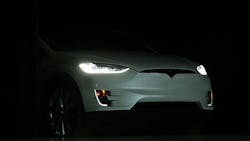AUTO SHOW: Can Tesla Still Lead Electric Car Race? It Wants To
DETROIT — Tesla’s swift rise to both create and dominate the luxury all-electric car market has stunned Detroit.
To hold that lead to the next plateau — the self-driving, mass-market electric car widely seen as the future of the auto industry — founder Elon Musk is rapidly staffing up with the best talent he can find: computer programmers.
Rather than look to Detroit for help to build his cars, Musk’s 12-year-old company is focused on Silicon Valley to recruit some 1,600 software engineers for the next stage. They are to help develop Autopilot, Tesla’s autonomous car IT system, with capabilities like the Summon function announced this week that can allow Tesla owners to call the car from the garage to their side at will, like a pet.
In a sign of his determination to beat Detroit at its own game, last November Musk used Twitter to get his message out.
Autopilot is crucial if Tesla aims to have a fully self-driving car by 2018, and increase production 10-fold to 500,000 cars a year by 2020.
Ramping up production to that level, supported by Tesla’s own battery plant under construction in Nevada, is crucial to lowering the price of its cars to a more affordable level, perhaps $35,000, for the Tesla Model 3 electric sedan planned for 2017 — around a third of today’s price tag.
Such promises have kept financiers and investors still firmly behind Tesla, even though the Palo Alto company has continued to lose money while the big carmakers in Detroit rack up profits on the booming American auto market.
Tough Competition
If it meets its goals, Tesla could remain a player in the industry. But it is surrounded by likewise eager competitors. All of the large Asian, European and U.S. automakers are ramping up their work on electric, driver-less cars.
Crossing into the field with their substantial resources and tech capabilities are Internet giants like Google, Apple and Uber.
Also crowding into the race are Tesla-wannabes: startups like Chinese-backed Faraday Future — which unveiled its own Batmobile-looking electric car last week at CES in Las Vegas — Karma Automotive, Atieva and NexTex.
All of them appear to agree that the future of the industry is in electric cars that can drive themselves. And they are all battling for the best brainpower Silicon Valley has to offer.
Tesla has a march on the competition; the question is whether it can hold on. Its Model S and new Model X SUV both have Autopilot capabilities that allow hands-off driving in some situations, and it promises incremental expansions of those capabilities.
But rivals loom in the all-electric field that will test Tesla even before autonomous driving gains traction on the roads. Audi’s Q6 e-Tron promises a 300-mile range without charging by 2018, 50% more than Tesla’s cars currently. Mercedes-Benz has its GLE hybrid, and BMW the X5. Porsche is putting $1 billion into its “Mission E” electric car and Aston Martin has an electric sports car based on its DBX concept targeted for 2019.
“This is going to be very tough for Tesla,” said Jessica Caldwell, an industry analyst at Edmunds.com. “Porsche is an established name. They have a lot of marketing money, they have a lot of credibility, they have a strong dealer network. ... You can say the same for Audi.”
At the more affordable end, General Motors is rushing to market the Chevrolet Bolt, to arrive next year as a challenger to Tesla’s Model 3. In the same price range, too, there is already BMW’s mini-electric i3.
Karl Brauer, an analyst at Kelley Blue Book, said Tesla “has the cachet, they have the prestige the competition doesn’t have. Tesla is the Apple of the automotive industry.”
Even so, he warned, to hold its lead, Tesla needs to keep an eye on the calendar as well as innovate. The new Model X was around two years late on its original timeline.
But former GM executive Bob Lutz thinks Tesla, as it bleeds money, is a poor bet to win the race for the car of the future.
“Tesla is still doomed,” he said. “Whatever uniqueness they have, it’s disappearing. ... They have to learn how to make money like other car companies.”
By Luc Olinga
Copyright Agence France-Presse, 2016
About the Author
Agence France-Presse
Copyright Agence France-Presse, 2002-2025. AFP text, photos, graphics and logos shall not be reproduced, published, broadcast, rewritten for broadcast or publication or redistributed directly or indirectly in any medium. AFP shall not be held liable for any delays, inaccuracies, errors or omissions in any AFP content, or for any actions taken in consequence.
